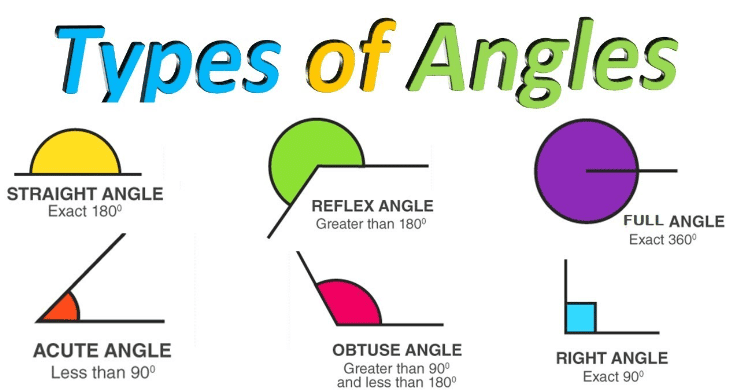Types of Angles


Before defining what is an angle? It is important to know its parts. An angle is made up of two important elements: the vertex and the rays.
The vertex is defined as the corner or end of a ray. And the ray is the straight part, which together with a vertex forms an angle.
Then, it can be concluded that an angle is a portion of a plane limited by two rays or rays that have the same point or vertex in common.
The angle according to its nature can be classified in three different ways: its size, position, and sum of its rays.
Types of angles according to their size:`
Flat angle.
It is when the angle measures 180° degrees. This type of angle is called a plane because it is perpendicular to the line formed by the opposite vectors, at the time we draw it, it is not even perceived because it is immersed in the plane.
full angle.
It is the type of angle that measures 360° degrees. This type of angle is born when we place the point of the compass on a surface, and draw a 360-degree circumference, a complete or perigonal angle is created around the diameter. It is called perigonal because it covers the entire plane in the available degrees.
Null angle.
When the angle measures 0°. It is called null because this type of angle simply does not exist, and its value in any denomination and unit is zero.
Right angle.
It is when the angle measures 90°. It is important that you are very clear that a right angle can be rotated or oriented in any way. What ultimately matters is that the interior angle is 90° degrees.
Acute angle.
This is when the angle measures less than 90°. It is an indefinite portion of a plane that is limited by two lines that start from the same point or by two planes that start from the same line and whose opening can be measured in degrees.
Obtuse angle.
It is when the angle measures more than 90°.
Types of angles and their position.
- Consecutive angles: when the angles have the same vertex and a side in common.
- Adjacent angles: when the angles are consecutive and together they form a straight angle.
- Opposite angles by the vertex: when the angles have a common vertex and the sides of one are extensions of the sides of the other.
Types of angles according to their sum.
- Complementary angles: are those angles whose sum is equal to 90°.
- Supplementary angles: are those angles whose sum is equal to 180°.
Math’s Related Posts:
Recent Posts
Is energy quantized in classical physics?
No, according to classical wave theory the emission of electromagnetic radiations from the surface is…
Types of laser
Basically, there are four types of laser which includes: Gas Lasers Solid State lasers Liquid…
Ultrasound frequency range
What is ultrasonics? The study and application of mechanical vibrations with frequencies beyond the limits…
Electromagnetic Energy: What are some examples of it?
Electromagnetic energy definition Electromagnetic energy is the amount of energy stored in a region of…
Fundamental units and Derived Units with Examples
The Main Difference between fundamental Units and Base units is that Units that Express base…
Newton’s First law of Motion Examples in Our Daily Life
Newton's first law of motion states that " A body continues its state of rest…